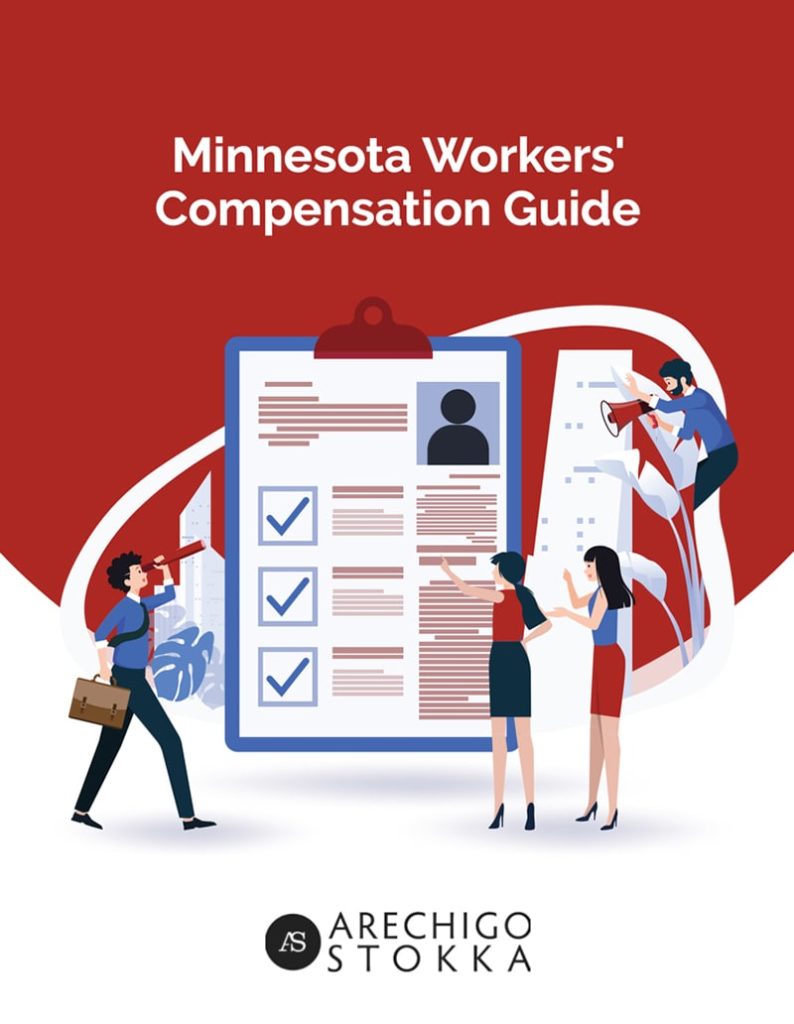
Workers’ Compensation Lawyers Assisting Clients in Minnesota
If you are injured on the job in Minnesota and cannot return to work due to the severity of your injury, you may be eligible to file a claim for Minnesota workers’ compensation.
Under Minnesota law, most workers who sustain serious injuries or illnesses in the course of their employment are eligible to seek Minnesota work comp benefits.
However, there are some exceptions to the rule, and there are very specific guidelines that govern when and how an injured worker must file a claim.
Filing a workers’ comp MN claim can be extremely complicated, and there are various reasons that your claim can be denied. With the help of a workers’ compensation MN attorney, you can ensure that you take all necessary steps in the initial process of filing your claim.
If you have already filed a claim and are facing a denial of benefits, one of the dedicated attorneys at our firm can assist with your appeal.
Do not hesitate to get in touch or call (651) 222-6603 to speak with the experienced Minnesota workers’ compensation lawyers at Arechigo & Stokka to learn how we can assist with your case.
[DOWNLOAD] Minnesota Workers’ Compensation Free Guide

What is Workers’ Compensation in Minnesota?
Workers’ compensation insurance is a type of insurance that most employers in Minnesota are required to carry, and it can provide coverage to employees who sustain illnesses or injuries on the job. When an employee gets hurt at work or as a result of his or her employment, that employee can file a workers’ compensation claim in order to seek benefits.
Typically, Minnesota workers’ compensation coverage can compensate an injured employee for a portion of his or her lost wages, as well as medical coverage for the injuries, suffered on the job.
Injuries must be work-related injuries, or arise out of the course of employment, in order to be eligible for coverage. The Minnesota Department of Labor and Industry (MDLI) defines a work-related injury as “any condition that is caused, aggravated, or accelerated by employment activities.” Traumatic injuries, gradual injuries, and occupational diseases all may be covered by workers’ comp.
For example, an injury that happens on a job site typically will be covered. If a worker drives a vehicle as part of his or her job duties, then injuries sustained in a traffic crash also may arise out of the worker’s job and may be covered by workers’ comp.
However, injuries sustained in a crash on the way to work will not be eligible for workers’ comp MN coverage.
MINNESOTA WORKERS’ COMPENSATION REQUIREMENTS FAQ
Mandatory Coverage: Who is Eligible for Workers’ Compensation Benefits in Minnesota?
Generally speaking, most employers in Minnesota are required to have workers’ compensation insurance. To be clear, Minnesota has what is known as mandatory coverage when it comes to workers’ comp. As such, most employers who hire other people to perform services are required to buy workers’ compensation coverage or self-insurance.
Even employers who only hire minors or non-citizens are required to have workers’ compensation coverage under the mandatory coverage provisions. In some cases, even volunteers are covered by workers’ comp.
However, there are some exceptions.
Minnesota Workers’ Compensation Exceptions
While these exceptions are limited mostly to certain small business situations, the following are some examples of employers who may be exempt from purchasing workers’ compensation insurance under Minnesota law:
Sole Proprietors
If a person is a sole proprietor of a business, that small business owner is not required to have workers’ compensation coverage for herself or for close family members working in the business (such as children, a spouse, or parents). However, it is important to be clear that a sole proprietor is required to have workers’ compensation coverage for other employees.
Partnerships
Businesses that are structured as partnerships, similar to sole proprietorships, tend to be exempt from coverage for the partners and for close relatives of the partners who are employees of the business.
Executive Officers in Closely Held Corporations
In some closely held corporations, an executive officer is exempt from workers’ compensation coverage. However, numerous requirements must be met in order for the executive officer to be exempt.
Managers in LLCs
Managers of limited liability companies (LLCs) are, in some situations, exempt from mandatory coverage for workers’ compensation.
Other parties may be exempt, and it is important to confirm with an experienced workers’ comp MN lawyer whether coverage is mandatory. Just because a person is exempt does not mean that the person cannot elect to provide workers’ compensation coverage. If an employer is exempt but elects to provide coverage, then any employees who are covered can be eligible to file a claim.
Types of Disability Benefits Provided By Workers’ Compensation
Workers’ compensation benefits tend to provide compensation for four different types of disability benefits:
Temporary Total Disability
Temporary total disability means your injury prevents you from returning to work in any capacity, but you are expected to recover (at least in part) from your injury.
Temporary total disability benefits, or TTD benefits, pay two-thirds of an employee’s average weekly wage with a maximum of the 2019 statewide average weekly wage (SAWW) of $1,112.00. Typically, TTD benefits are paid for a maximum of 130 weeks. In some cases where an employee is in a vocational rehabilitation program, TTD benefits can be extended.
Temporary Partial Disability
Temporary partial disability means your injury prevents you from returning to work in your full capacity, yet you are able to return to work in a part-time or modified capacity.
You are also expected to recover from your injuries. Compensation is two-thirds of the difference between your earnings if you were at full capacity and your modified earnings. TPD benefits typically are available for a maximum of 225 weeks.
Permanent Partial Disability
Permanent partial disability (PPD) benefits are designed for injured workers who suffer a permanent disability, but your disability does not prevent you from working entirely.
For example, most permanent partial disability benefits involve the loss of function of part of the body. The amount of PPD benefits depends upon the type of permanent disability and the severity of it. For example, the loss of an entire arm would result in higher PPD benefits than the loss of a finger.
Permanent Total Disability
Permanent total disability is when an injury is permanent and is so severe that it prevents a worker from ever obtaining gainful employment again, that worker may be eligible for permanent total disability (PTD) benefits. PTD benefits are two-thirds of the employee’s average weekly wage, with a maximum set by the SAWW. For 2019, that amount is $1,112.00 per week.
Types of Medical Treatment Covered By Minnesota Workers’ Comp
Minnesota law requires workers’ compensation coverage to provide compensation for a variety of medical benefits that are reasonable and necessary to treat the injury.
Examples of potentially covered medical treatments may include:
- Psychological care;
- Chiropractic care;
- Podiatric care;
- Surgery; and
- Hospital treatment.
Related article: Can My Employer Contact My Doctor Without My Consent?
How to File a Minnesota Workers’ Comp Claim
In order to file a Minnesota workers’ comp claim, it is extremely important for an injured worker to follow all Minnesota workers’ compensation requirements under Minnesota law.
The following are the necessary steps in an MN workers’ comp claim process:
- Report your workplace injury to your employer as soon as possible, but within 14 days from the date of your injury;
- File a workers’ compensation claim within 30 days from the date of your injury;
- Employer must file a First Report of Injury Form and provide the employee with a copy;
- Insurer must file a report with the Minnesota Department of Labor & Industry, or MDLI, within 10 days from the date it receives the report from the employer;
- The insurance company has 14 days to investigate the employee’s claim and to determine whether the employee is eligible for benefits; and
- Employee is informed about the outcome of the claim.
If an employee’s Minnesota workers’ compensation benefits claim is denied, the employee may be eligible to appeal the denial of benefits. If the claim is accepted, there may be a waiting period before the employee can begin obtaining benefits. Typically, when an employee has lost time from work, there will be a waiting period before benefits start.
Seeking Medical Treatment for Your Minnesota Workplace Injuries
In Minnesota, an injured employee who is covered by workers’ comp is permitted to choose their own healthcare provider for treating or managing a work-related injury.
However, there are some circumstances in which an employer can require an employee to see a particular doctor, including in the following situations:
- As part of a managed care plan;
- When an employer is part of a collective bargaining agreement; and/or
- When an employee requires prescription or nonprescription medications, the employer can require the employee to obtain the medicine from a pharmacy within 15 miles of where the employee lives.
Appealing a Workers’ Compensation Claim Denial in Minnesota
An experienced MN workers’ comp attorney can help if your claim was denied.
In some cases, a minor error resulted in the denial. In other situations, you may need to move forward with a dispute resolution process.
If you need to file a formal appeal through the MDLI, you will have three years from the date of your workplace injury to do so. Your case will be heard by an administrative law judge who handles workers’ compensation cases.
Contact a Minnesota Workers’ Compensation Lawyer Today
If you have questions about filing a workers’ compensation claim in Minnesota, or if you need help handling an appeal after receiving a notice of denied benefits, one of the dedicated Minnesota workers’ compensation attorneys at our firm can begin working on your case with you today.
Contact us online or call Arechigo & Stokka at (651) 222-6603 to learn more about the services we provide to injured workers in Minnesota.
Check out our other articles:



